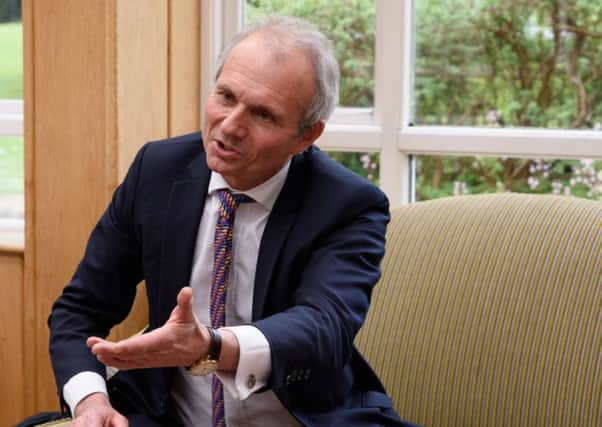Farm grants at risk from Brexit, says Europe minister on NI visit


David Lidington said that future farming grants would be at the goodwill of a British government if the country deciding to quit Europe.
The Conservative MP for Aylesbury also said Brexit might inflame Scottish nationalism and destabilise the UK.
Advertisement
Hide AdAdvertisement
Hide AdMr Lidington, who has been Whitehall’s longest-serving Europe minister, having held the post since the Tory-Lib Dem coalition came to power in 2010, was speaking from the Dunadry Hotel in Co Antrim.
Asked about the impact of Brexit on agriculture and fisheries at a town hall-style meeting at the hotel, he told the audience: “If we leave then the current farm support arrangements and any money that goes to fisheries in Northern Ireland, that drops out straight away, so you would have to rely upon a future government making equivalent sums available and matching those the [remaining 27 EU nations] might in the future give to their ministries.”
He added: “You can’t guarantee it, you will rely upon a UK government facing a recession, a big economic hit, being willing to give agriculture or fisheries that priority.”
Agriculture and fisheries would have other problems too, he said. Noting that more than 90% of UK lamb and beef exports and 70% of fish or shellfish exports go to elsewhere in the EU, he said: “They go tariff free, they go without any extra sanitary checks or other regulations. Now again you cannot guarantee any of that if we are outside.”
Advertisement
Hide AdAdvertisement
Hide AdIn an interview with the News Letter after the meeting, Mr Lidington said that he was “a unionist when it comes to both Northern Ireland and Scotland”. But, he added, Nicola Sturgeon would use Brexit “to try to justify a second referendum so again a British exit would be a destabilising factor for the United Kingdom, the integrity of the UK”.
He said that there would be “a lot of uncertainty as to what happens with the [Irish] border” if the UK leaves the EU.
“Any British government would want to continue the Common Travel Area.” But, he said, if not “in a free trade customs union with the EU there might have to be tariffs or if not tariffs then customs inspections at the border”.
Mr Lidington also said that if the Republic had an EU external border then “because of EU fears about cross-border crime and so on it might, they might find themselves under an obligation from the EU to impose stricter border checks on the global movement of both people and business goods across the border and I know that is something that worries the Irish government a great deal”.
Advertisement
Hide AdAdvertisement
Hide AdMr Lidington acknowledged that the EU faces major problems such as those with regard to the eurozone. “But the challenges that Europe faces are going to be there and they are going to affect us whether we are in or out.
“Our leaving the EU will not stop anybody from crossing the Mediterranean to Europe. What it would do is make it more difficult for European countries to put together a coherent and effective response,” he said.
Asked if he sensed any growing impatience towards Britain in the rest of the EU, and any feeling among those countries that the UK should now quit, he replied: “I think the reverse is true, I think there is very real concern in other European governments that a British departure would have a destabilising impact upon – both upon the EU but also upon the western alliance more broadly – it is very striking that the secretary general of Nato has come out so strongly in favour of British EU membership.”